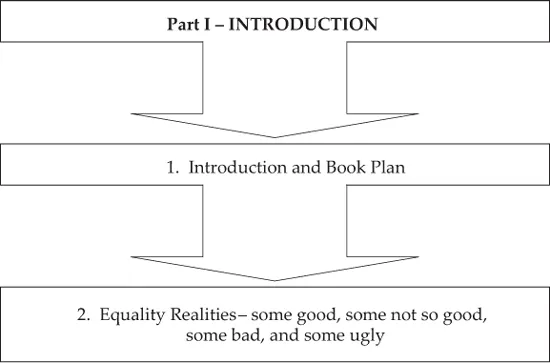![]()
PART I
Introduction
Part I Schematised
![]()
1
Introduction and Book Plan
BOOK PURPOSE
The purpose of this book is to offer an overview of the processes of the formulation, implementation, and management of the Agenda for Equality, Diversity, Opportunity, and Discrimination (or Anti-Discrimination). The text refers to this agenda by use of the acronym EDOD for reasons of brevity.
Powerful and well-resourced agendas for equality, diversity, opportunity, and anti-discrimination are now widely established in Western democracies, particularly where these countries possess a polyglot or a multicultural character that results from past imperial history (as in the UK, France, or The Netherlands), or from extensive involvement in foreign trade, or from policies that actively encourage immigration (as in the case of the USA and Canada).
EDOD concepts are, for very good reasons, well established in such societies. Matters of opportunity and social mobility are seen as key components of social cohesion, stability and harmony. Failures of compliance with agendas for equality and diversity – or worse, incidences of discrimination, victimisation, or retaliation – are increasingly seen as unacceptable, whether from an ethical, legal, political, medical, or economic viewpoint. The risks of failures of compliance are escalating rapidly, be it in terms of litigation or cost, the potential for damage to reputation or communal trust, the possibility of the loss of government or public sector contracts, the dismissal of responsible executives, or the likelihood of direct external intervention.
THE KEY AREAS OF APPLICATION
This book describes the formulation, implementation, and management of the EDOD Agenda in three mandatory areas:
1. employment and the workplace;
2. service provision;
3. neighbourhood and community management.
The necessary choice of these three key areas of application reflects a typical focus of government policy, legislation, and case law in the West.
TARGET READERSHIP
This book will be of direct relevance to individuals and organisations:
• for the requirements of the practitioner, the manager, and the political or community representative, whether in the private, the public, or the social enterprise sector;
• for the purposes of corporate governance;
• for the purposes of policy-making, planning, and decision-making;
• for the requirements of applied research and scholarship in the academic sector.
The book will be of direct practical value in the processes of the training, development, or socialisation (i) of people who are responsible for corporate or public sector governance, and (ii) of managers, employees, and political or community representatives, again whether in the private, public, or social enterprise sectors.
SOME PRINCIPLES USED TO WRITE THIS BOOK
Some of the principles upon which the writing of this book has been based include the following:
Overview of EDOD issues – in which there is a need for an overview of the EDOD Agenda as a whole, along with the generic contingencies and dilemmas associated with that agenda, in order to facilitate the development of proper understanding, application, and implementation.
Clear focus on implementation – by which there is a strong focus on necessary EDOD objectives, and on the individual and corporate capability, competence, process, and behaviour required to deliver the necessary outcomes of these EDOD objectives.
Proper management framework – in which there is a systematic application of a proper and credible conceptual-theoretical framework based on established principles of management and of strategic management. These principles, inter alia, can be drawn from the author’s established, tried and tested publications, both published by Ashgate:
• Principles of Management;
• Principles of Strategic Management.
Credible personal experience – by which the author has applied the insights and specialised legal and medical knowledge (expensively) acquired in the course of successfully defending his own rights in EDOD matters. The author is himself categorised as disabled within the meanings of the UK Disability Discrimination Act 1995, and the UK Disability Discrimination (Public Authorities) (Statutory Duties) Regulations 2005.
Professionalisation – by which the book contends that the formulation, delivery, and management of the EDOD Agenda will inevitably have to be moved towards the achievement of standards of performance management that may be categorised as being professional, of best practice, excellent, at plus Six Sigma, or of high trust. Anything less may become unacceptable, at least in the fields of employment and service provision that, by definition, must to a very significant degree be controllable and manageable by those responsible for them.
Taking responsibility – by which it can be argued that there are few (if any) excuses for discrimination or incidences of EDOD non-compliance, and no excuses at all in the fields of employment or service provision. Such shortcomings may demonstrate evidence of irresponsible or ineffective leadership; failures of governance; an impoverished, incompetent or uncaring management, and the incurring of avoidable, unnecessary, and potentially highly damaging costs. Such shortcomings also represent a refusal of individuals, entities, or organisations to accept the proper responsibilities towards the society from which custom is drawn, revenues or taxpayers’ money received, or that was the direct creator of institutional purpose.
THE APPROACH TAKEN BY THIS BOOK
By making use of an appropriate conceptual-theoretical framework, personal experience, evidential case studies and illustrative case examples, and a growing body of international knowledge about the subject, this book identifies and analyses the strategic and managerial contexts and components of an Equality, Diversity, Opportunity, and Anti-Discrimination Agenda. It examines issues, variable factors, contingencies, and dilemmas associated with the formulation and implementation of such an agenda.
The book applies a strategic and a performance management-orientated overview of relevant issues of leadership and corporate governance; management process; managing social architectures; education, training and development; resource management and performance assessment, and risk and change management.
The approach taken in this book to the analysis of the formulation, management, and implementation of EDOD issues is:
• reader-friendly, focused, and to the point;
• written from a scholarly and credible perspective, but in an applied and practitioner-orientated manner;
• strongly implementation- and delivery-based;
• based both on a comprehensive overview and an internally consistent synthesis of the various strands of the EDOD Agenda, and of the variable factors or variables associated with that agenda. Any single EDOD issue cannot realistically be viewed in isolation from other contexts or component variables of the EDOD Agenda if it is to be objectively understood and properly managed;
• contextualised within increasingly resource-constrained conditions. Any analysis of the management of EDOD issues that fails to take resource limitations into account is likely at best to be naïve and at worst misleading;
• contextualised within a framework of strategic and performance management as described above. It is the contention of the author that a proper understanding and implementation of EDOD matters can only be achieved if they are the subject of systematic strategic and performance management; informed and committed corporate governance and leadership; prioritisation or mainstreaming; and effective management and motivation at the level of delivery. There is likely to be little or no alternative as ethical, social, and political pressures for equality and opportunity strengthen, and the sanctions for non-compliance become more aggressive;
• necessarily based in part on the use of dilemma-based methodology. The formulation, financing, and delivery of an EDOD Agenda will inevitably give rise to dilemmas that will have to be recognised, understood, managed, and where possible resolved by those responsible for them. ‘One size fits all’ or ‘tick box’ type approaches may work in the real world, but equally they may not.
EQUALITY STATUS AND ITS CONSEQUENCES
Equality status may ultimately be conceptualised as taking any one of only three alternative forms. The nature of these three alternative forms is the subject of detailed treatment throughout this book. They are described as follows.
Equality-positive, proactive, and prioritised – a status in which EDOD provision is significantly in advance of the minimum required standards of performance and compliance. EDOD issues are the subject of systematic strategy formulation and performance management, and are characterised by a proper understanding of the moral, ethical, and practical benefits of mainstreaming equality, diversity, and opportunity issues into the establishment of strategic, business, operational, and social purpose. The benefits of such an equality status may include reputational gains, the award of government licences and contracts, and the avoidance of generic and unnecessary Costs Of Poor Quality (COPQ).
An equality-positive status is likely to be associated with well-informed and proactive corporate governance and management process.
Equality-neutral – a status in which EDOD provision is perceived to meet all necessary current standards of performance, but is driven by a focus that is restricted to the need for compliance with the law; and for evidence of that compliance.
In this sense, equality and diversity issues could be seen as being ‘bolted on’ to the mainstream activity of the entity or the organisation. The management of equality issues might then be delegated to some kind of legal, equality, or diversity function, or instead be made the responsibility of a Personnel or Human Resource Management department. Whether such delegation is associated with a functional authority to require compliance from line managers will be a matter for decision by those involved in corporate governance or senior management.
Equality-neutrality may be proactive or reactive in nature, focusing mainly on EDOD risk and the potential costs of non-compliance as forms of Costs Of Poor Quality.
Equality-negative – in which, for whatever reason, EDOD performance and compliance (if any) falls below the required standard, or is prone to blind spots, and is in consequence potentially subject to any of a range of EDOD risks and Costs Of Poor Quality. These could include compensation payments and legal costs, loss of government or public sector contracts, reputational damage, the dismissal of accountable executives, and the potential for external intervention and investigation.
Equality-negativity might be associated with a disinterested or dismissive attitude towards EDOD issues and EDOD risk at the level of corporate governance and enterprise management. An equality-negative status might instead be associated with an ignorant, incapable, incompetent, or corrupt corporate governance and management process.
WHAT CAN HAPPEN IF SOMEONE GETS IT WRONG
Evidential case examples of equality negativity or failures of EDOD compliance described in this book include the following:
1. an UK award of £4.5 million in compensation to a Polish doctor who was subject to race and sex discrimination by her hospital colleagues;
2. UK football supporters declaring angrily that they no longer wish to be associated with clubs whose players indulge in openly racist behaviour during matches, and whose management appear to be in denial about their responsibility as employers in the matter;
3. the payment of a total of $67.5 million to 24,508 US workers who had been subject to unlawful employment discrimination in 2008 alone. During the period 2001–2010 a total of 153,067 US employees were compensated for incidences of such discrimination;
4. the threat of loss of major US Government contracts for the supply of food products to the US armed services and to schools which was made...

